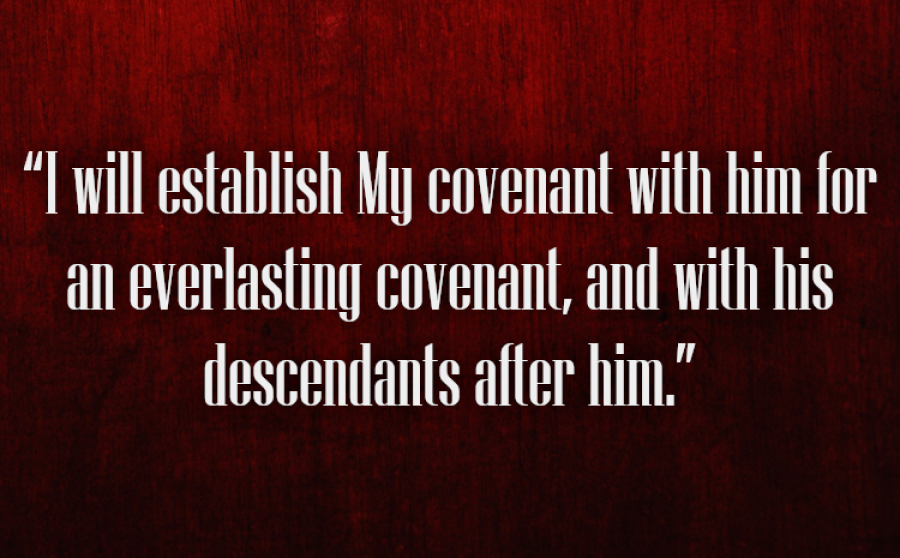Some Little-Known Prophecies of Christmas: Part 3 – Genesis 17:19
Image

Read Part 2.
The Messiah was a descendant of Abraham.
More than that, we considered last time how He was, in fact, promised within the covenant that God made with Abram (Gen. 12:1-3). According to the Apostle Paul in Gal. 3:16 and 19, He is the ultimate recipient of that covenant!
Our Savior Jesus Christ is finally the One through whom “all the families of the earth shall be blessed” (Gen. 12:3). Paul also quoted and discussed that portion of the covenant in Gal. 3:8-9.
We ended last time with the realization that the promised Messiah would be the final Davidic king over Israel. As declared then, however, there are several intermediate steps, with accompanying prophecies, which are given between the times of Abraham and David and speak about His coming and the offices He would hold as the greatest prophet, priest and king.
And there are also more ancestors named, each playing their roles in this prophetic drama.
One of the most pivotal individuals in the story is really quite an enigmatic character, when you think about it. We don’t sing about him, or even preach about him much—outside of the humility he showed to his father in one of the latter’s great acts of faith (see Gen. 22:1-19).
He never took a long journey of faith like his father had, and did not set out on any of the extreme adventures—for good or for bad—that his sons would experience.
The story behind his birth still staggers hearers today—just as it did for his father and mother (see Gen. 17:17; 18:12-15)! The only other thing that stands out about him is his handling—mishandling?—of a major situation that occurred before his death (see Gen. 27:1-28:5).
In between, his whole existence seems like it could be summed up in the words of the Apostle Paul in 1 Thess. 4:11:
That you also aspire to lead a quiet life, to mind your own business, and to work with your own hands.
His parents had a bride selected for him, but not until he was 40 years old (see Gen. 24; 25:20). Before that, Scripture focuses mostly on his distinction from his half-brother. After that, it places the spotlight mostly on his two sons.
I am referring, of course, to Isaac, the man of laughter (see Gen. 21:6). I am sure he had a very affectionate relationship with his parents, and I am guessing that included many times of laughter—as he would later find joy in his wife and sons (see Gen. 24:67). He probably spent lots of time in his father’s fields, also (see Gen. 24:63).
In Gen. 26, it appears that God really tested and stretched Isaac’s faith personally (see especially vv. 1-5 and 23-33). Amazingly, he made the Hall of Faith, in Heb. 11:20!
But even more astonishing is his place in the line of the Messiah, and the promises the Lord gave in that regard. The assurances of the coming Messiah went directly through him!
Then God said: “No, Sarah your wife shall bear you a son, and you shall call his name Isaac; I will establish My covenant with him for an everlasting covenant, and with his descendants after him.” (Gen. 17:19)
Just as we saw last time, the hope of Messiah is contained in that word “descendants.” Think of it—all those years the future nation of Israel, the future of the kingdom of God on the Earth, rested on Isaac as he walked, worked, played and prayed. There wasn’t even another brother in his family who could pick up the slack if something happened to him. And once his father died, it was only him and his two teenage sons (see Gen. 25:7-11, 26). He lived much of his life trusting in the promise which was made to his parents, until he heard it directly in Gen. 26.
Yet God’s plan was clear: “In Isaac your seed shall be called,” (Gen. 21:12; Rom. 9:7). “Abraham begot Isaac, Isaac begot Jacob, and Jacob begot Judah and his brothers” (Matt. 1:2).
The Messiah would be the son of Abraham, Isaac and Jacob—then Judah.
And we’ll begin with him next time, in the final installment for this season of Advent.
Scripture taken from the New King James Version®. Copyright © 1982 by Thomas Nelson. Used by permission. All rights reserved.
Paul Scharf 2019 Bio
Paul J. Scharf (M.A., M.Div., Faith Baptist Theological Seminary) is a church ministries representative for The Friends of Israel Gospel Ministry, serving in the midwest. He also assists Whitcomb Ministries and writes for “Answers” Magazine and Regular Baptist Press. For more information on his ministry, visit foi.org/scharf or email [email protected].
- 56 views


Discussion